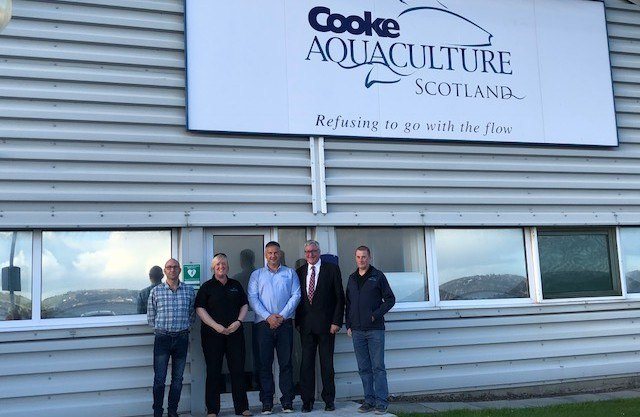(Kirkwall in Orkney): On Thursday, September 27th, the Scottish Government’s Cabinet Secretary for Rural Economy, Fergus Ewing, visited Cooke Aquaculture’s Orkney headquarters in Kirkwall to hear about progress made at the company’s new high-energy salmon farming site at East Skelwick, North Sound, Westray.
The development of high-energy sites forms an important part of sustainably growing the Scottish aquaculture industry, allowing a controlled expansion into new locations and complementing the potential to increase capacity at existing sites. The experience gained by Cooke at the East Skelwick site is eagerly anticipated by the wider fish farming community.
The new site will consist of eight pens measuring 130 metres in circumference, the largest currently used in Scotland. Compared to existing farms, the East Skelwick site is in a more exposed location – 2.5km from the nearest landfall – and is equipped with durable, state-of-the-art technology that can withstand sustained exposure to high wind and wave loads.
The innovative new equipment includes a wave measurement buoy, a weather station incorporating hydrographic sensors, and real-time environmental sensors. They have been procured with assistance from the European Maritime and Fisheries Fund (EMFF), negotiated by the Scottish Aquaculture Innovation Centre (SAIC) with Marine Scotland.
Mr Ewing said: “Cooke are championing innovative approaches to sustainably growing the Scottish aquaculture industry, and are a fantastic example of what can be achieved in Scotland when there is a combination of vision and wider support. It was great to see yet another example of how the aquaculture sector is adapting and being innovative when thinking about sustainable growth, and I wish them all the best moving forward.”
“To maximise the data gained from the new site, wind, wave and hydrographic conditions will be monitored in real-time, alongside routine farm operational observations,” said Colin Blair, Managing Director, Cooke Aquaculture Scotland. “This enables the resilience of cages and moorings, site accessibility and salmon performance to be correlated with the prevailing physical conditions, including any extreme weather events.”
“We’re delighted with the progress at Cooke’s high-energy site, and with having helped generate EMFF funding for its equipment. We will liaise with Cooke Aquaculture to help ensure that the important data from these instruments is interpreted fully, allowing a more accurate assessment of site performance. This will give the industry good, usable information for these types of sites going
forward,” added Dr Robin Shields, Senior Aquaculture Innovation Manager at the Scottish Aquaculture Innovation Centre (SAIC).
The industry continues to work with agencies and universities to research and develop new and effective techniques to rear healthy fish and keep them safe. Salmon farming is a major contributor to the Scottish local and national economies. Farmed salmon is a key part of Scotland’s world-renowned food industry, accounting for around 40% by value of Scottish food exports. It represents a huge Scottish success story and is an outstanding example of a ‘good food’, both in terms of its exceptional nutritional value and its standards of production.
Pictured, from left to right: Christopher Webb (Environmental & Development Manager, Cooke Aquaculture); Vicci Laird (Head of HR, Cooke Aquaculture); Stewart Rendall (Westray/East Skelwick Manager, Cooke Aquaculture); Cabinet Secretary for Rural Economy, Fergus Ewing; and Robert Peterson (Orkney Area Manager, Cooke Aquaculture)
